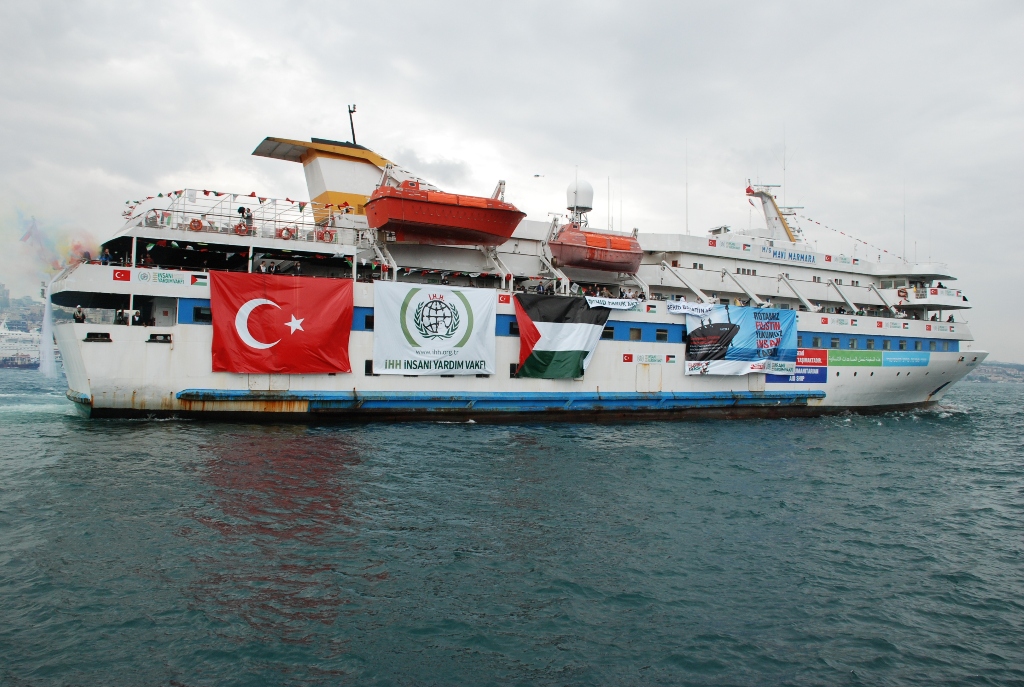The Mavi Marmara: Israel, Turkey and Justice
Jun 10 2014 / 9:13 pm
By Greta Berlin.
Op Ed News – Four years ago, Israeli commandos attacked the MaviMarmara and five other ships in the Freedom Flotilla, in international waters, while they were heading to Gaza. The Flotilla, which Free Gaza helped organize along with the Turkish charity, IHH Humanitarian Relief Foundation, was determined to break the blockade of Gaza and bring humanitarian aid to the people there. Eight Turks and one American were killed on board the Comoros-flagged Mavi Marmara ( a tenth man recently died from his wounds) and many others on all the ships were injured, some seriously.
On 26 May 2014, the Istanbul Criminal Court issued arrest warrants for four former Israel military officials who ordered the 2010deadly commando raid. They are: Israel’s former Military Chief of Staff, Gabi Ashkenazi, former Navy Chief, Eliezer Marom, former Military Intelligence Chief, Amos Yadlin, and former Naval Intelligence Chief, Avishai Levy.
These arrest warrants are historic – the first time a criminal court has sought to hold Israeli officials accountable for their criminal acts against civilians.
According to the Court, the warrants are necessary because the defendants are fugitives, having failed to appear at the hearings or otherwise respond to the Court’s summons. If any of these officers enters Turkey, he will be arrested. More importantly, the Turkish government can request the extradition of any of them should they enter a country with an extradition agreement with Turkey — including the United States.
The Turkish Court is still preparing the arrest warrants to send to the Ministry of Justice for it to forward to Interpol with a request thatinternational Red Notices for the arrest of the Israeli officers be issued so they can stand trial in Turkey. Should Interpol publish the international arrest warrants, the former Israeli officers would be under threat of arrest in all 190 countries that are members of Interpol.
According to the Turkish Penal Code, the Israeli officials are charged with intentional homicide, attempted murder, deliberately injuring, plundering, piracy, damage to property and deprivation of liberty The prosecution has demanded life sentences for the four, based on 33 complaints lodged by the victims’ families.
The trial began on November 6, 2012, and several hearings have taken place over the past 18 months. The court heard testimony from 490 individuals, including family members of those killed as well as activists from 37 countries who appeared as victims and witnesses.
Israel has already appealed to Interpol not to honor the arrest warrants, alleging that the Turkish Court’s ruling is “tainted by political motives.”
What affect will the Turkish Court ruling have on the referral of Comoros to the International Criminal Court regarding the criminal attack on the Flotilla?
Comoros referred the Israeli attack on the Mavi Marmara (considered to be Comoros territory because it flew its flag) to the ICC in May 2013. One year later, no decision has been made by the ICC Prosecutor whether to begin an investigation. In May 2014, a team of UK international criminal law experts joined the legal team in to pursue justice for the victims through the ICC processes. The team is headed by Professor Sir Geoffrey Nice QC, who participated in the prosecution of Slobodan Milosevic, the former Serbian President. The team met with ICC Prosecutor Bensouda, and she remarked that the referral was “controversial” She advised that she would make a decision whether to open an investigation in the next couple of weeks.
The victims, through their lawyers, made clear that controversial is not a good reason for the ICC to fail to administer justice, and urged the Prosecutor to immediately begin conducting a full investigation. They insist that the allegations are serious enough to warrant ICC attention, especially when seen in the context of the protracted armed conflict and humanitarian crisis in Gaza.
The implications of the latest developments in Turkey for the pending ICC referral are unclear. According to the principle of complementarity enshrined in the Rome Statute, the ICC is a court of last resort, in case national trial procedures are not available or prove to be ineffective.
Since a Turkish criminal court is actively pursuing the matter, it could affect the ICC Prosecutor’s decision whether to open an investigation. The ICC will not intervene if relevant national authorities are conducting genuine investigations or prosecutions – and this might be used, in good faith or not, by the ICC Prosecutor, to delay her decision, or even to reject jurisdiction. However, if the arrest warrants cannot be served on the Israeli defendants and they are not brought to face the charges, it would show the impossibility of the Turkish national prosecution obtaining justice – and indicate that ICC prosecution is necessary.
Israel has already shown itself incapable of objectively investigating and prosecuting its former top officials. The Turkel Commission report issued in January 2011 “cleared the government and military of wrongdoing,” saying that the “passengers were to blame for the violence.”
Conclusion
The Court in Istanbul has begun an historic process that may finally end Israeli impunity. The members of civil society who organized and participated in the Flotilla, as well as in other non-violent actions in support of Palestinian human and national rights, continue to demand justice for ourselves and for the countless Palestinian victims of crimes committed by the Israeli military.

